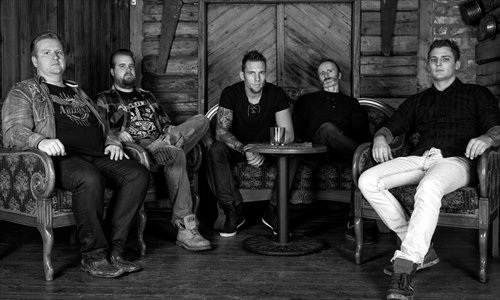Norwegian band goes against the flow for folk music

Norwegian band Byting pose for a photo in Telemark, Norway, in January, 2015. Photo: Courtesy of Byting
With the prevalence of English songs in Norwegian music circles, many musicians and singers have turned from their native language and styles to write songs in English. Unlike most local bands, however, Norwegian band Byting has remained a die-hard supporter of the country's folk music by taking traditional songs and turning them into popular national hits.
This newly formed band has been in the spotlight ever since the public discovered their unique and introspective sound through online music videos and local reality shows. Traditional folk music has become an increasingly popular genre of music to fans and critics in Norway, a trend for which Byting deserves much of the credit.
Inspiration from the past
"It's amazing how the unexpected can take your life and change its direction," Thomas Hellekås, the band's lead vocalist, told Global Times about the impact forming Byting has had on him.
"It's just an unintentional positive outcome."
Although Jon Elling Buen Garnås, a famous Norwegian musician who has won multiple folk music awards, died in a car accident in 2012, his influence can still be felt in the Norwegian folk scene.
"As my mentor, he offered me great suggestions and inspiration for my music creation. I made a music video to honor his memory and posted it online," Hellekås told the Global Times.
Far from what he expected, the sentimental video went viral on YouTube.
"I get plenty of messages every day from strangers telling me how much they loved my music and how much it meant to them," Thomas said.
Capitalizing on this opportunity, he found four like-minded lads to create a band: Per Anders Buen Garnås, the late Garnås' brother and multiple music award-winner, became the band's fiddler; Halvor Halvorsen, an experienced country music musician, came on as the band's drummer; Svein Eivind Mo Haugan, whose great-grandfather Eivind Mo was a legendary fiddler, plays guitar for the band.
"And our bass player Marius Skjelbred holds a degree in culturology, which helps the band promote Norwegian culture," Hellekås said proudly.
Shortly after the band was formed in 2012, Byting was invited to perform for a local broadcast station named Telemarkscene, where the band earned acclaim for their folk music and officially started their music career. Two years later, Byting released their self-titled debut album featuring 12 songs, all written in Norwegian and sung in the Telemark dialect.
"We released another single this summer and hope to write as many Norwegian songs as possible," Hellekås told Global times.
Faithful guardian
The name of the band gives a hint as to its fondness for traditional Norwegian culture. Byting means "changeling" in Norwegian. According to Scandinavian mythology, byting are human babies changed by trolls, who are normally strange and antisocial.
"We chose this name for our band, because we are all unruly wacks," Hellekås told the Global Times.
Byting practice what they preach. Unlike many young musicians who head to big cities chasing their music dreams, Hellekås and his band chose their hometown Telemark, a small county located in southeastern Norway, as their headquarters. The band is of the opinion urbanization and fast-paced lifestyles have consumed people's love for traditional music.
"People can easily churn out songs with the help of advanced technology," Hellekås said.
"But I think true music lies deep inside your heart. You need to make effort to unveil it. The inspiration for my songs came from the mountains where I live, the dialect which I speak everyday and of course our astonishing traditional culture. Byting's impact on the landscape of music is matched not only by its fabulous folk songs, but also its role in carrying traditional Norwegian culture forward."
Traditional songs are slowly fading away in Norway. In fact, Byting might be one of the last few bands which still sings in a dialect.
"You can still find people who love traditional music. As long as there are some of them, there is a hope for us," Hellekås said.
Newspaper headline: Musical ‘changelings’